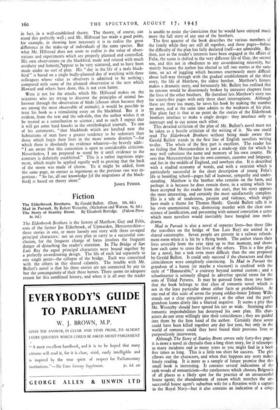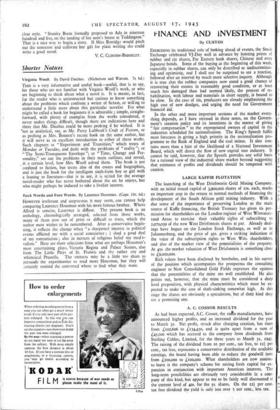Fiction
The Elderbrook Brothers is the history of Matthew, Guy and Felix, sons of the farmer Joe Elderbrook, of Upmarden, Mercestershire- three stories in one, or more loosely one story with three co-equal principal characters: not an easy plan to carry to a successful con- clusion, for the frequent change of focus involves the frequent danger of-disturbing the reader's attention. In The Bridge of San Luis Rey the equal principal characters were bound together by a perfectly co-ordinating design. The life of each led separately to one single point—the collapse of the bridge. Each was concerned with the others in this shared calamity. The trouble with Mr. Bullett's novel is that his three stories are not connected by any tie but the consanguinity of their three heroes. There seems no adequate reason for this combined history, and when it is all over the reader is unable to resist the conviction that he' would have enjoyed much more the full story of any one of the brothers.
The first quarter of the book describes the various members of the family while they are still all together, and these pages—before the difficulty of the plan has fully declared itself—are admirable. But then, just as the reader's interests have been engaged in the affairs of Felix, the scene is shifted to the very different life of Guy, the second son, and this not in obedience to any co-ordinating necessity, but merely because the author has elected to tell two stories at the same time, an act of juggling which becomes enormously more difficult about half-way through with the gradual establishment of the third story, the life of Matthew, the eldest brother. Matthew's history makes a dramatic story, and fortunately Mr. Bullett has realised that its tension would be disastrously broken by intrusive chapters from the lives of the other brothers. He therefore lets Matthew's story run for ninety-five pages with only three short interruptions. Although these are three too many, he saves his book by making the number no more, and at the same time admits to the weakness of his plan. The plain fact is that at no point do the stories of the Elderbrook brothers interlace to make a single design : they interlace only to interrupt and to cut across each other.
This detailed criticism of the plan of Mr. Bullett's novel must not be taken as a hostile criticism of the writing of it. No one could read The Elderbrook Brothers without being made aware that Gerald Bullett stands in the first line of English novelists writing to-day. The whole of the first part is excellent. The reader has no feeling that Mercestershire is just a made-up title for which he may well substitute the name and memory of his own county. He sees that Mercestershire has its own contours, customs and language, and lies in the middle of England, and nowhere else. It is described with a studied economy of words, and with a restraint which is particularly successful in the short description of young Felix's life at boarding school—pages full of humour, sympathy and under- standing. Matthew is the brother who remains on the farm, and perhaps it is because he does remain there, in a setting which has been accepted by the reader from the start, that his story appears the most interesting, and certainly the most satisfactorily complete. His is a tale of tenderness, passion and violence, which might have made a theme for Thomas Hardy. Gerald Bullett tells it in his even unemotional way, dismissing murder with the clear con- science of justification, and presenting with natural conviction a scene which most novelists would inevitably have bungled into melo- drama.
Mad in Pursuit is also a novel of separate lives—but these (like the travellers on the bridge of San Luis Rey) are united in a shared catastrophe. Seven people are present in a railway refresh- ment room when it is hit by a flying bomb. The author traces their lives severally from the year 1919 up to that moment, and shows how each came to cross the lives of the others. This is a fine plan for a novel, but a task even more difficult than the one proposed by Gerald Bullett. It could only succeed if the characters and their coincidences were completely convincing. In Mad in Pursuit the grandson of a baron (or maybe a viscount) is credited with the style of " Honourable," a courtesy beyond normal custom ; and a schoolmaster is seriously alleged to advertise special terms for the sons of Titled Persons. It may be guessed from these two hints that the book belongs to that class of romantic novel which is not in the least particular about either facts or probabilities. At one end of this scale of seven the young soldier-boxer Johnny Wilks stands out a clear attractive portrait ; at the other end the peer's grandson looms dimly like a blurred negative. It seems a pity that Mr. Westerby should have spread his net so wide. Straining after romantic improbabilities has destroyed his own plan. His char- acters do not stray willingly into their coincidences ; they are guided into them by the firm hand of the author. Certainly these seven could have been killed together any day last year, but only in the world of romance could they have found their previous lives so purposelessly interwoven.
Although The Story of Stanley Brent covers only forty-five pages, it is more a novel in chrysalis than a long short story, for it telescopes as many incidents and as many years as you might find in a book five times as long. This is a little too short for success. The plot elbows out the characters, and when that happens any story makes lonely reading. It is more as a sample of future promise that this small book is interesting. It contains several indications of the rank weeds of romanticism—the carelessness which chooses Belgravia of all places as a likely spot for the practice of an unsuccessful house agent; the abandonment of reason which matches the un- successful house agent's suburban wife for a flirtation with a captain in the Royal Navy—but it also contains an indication of a crisp, clear style. " Stanley Brent formally proposed to Ada in nineteen hundred and five, on the landing of her aunt's house at Teddington." That is a nice way to begirt a story. If Miss Berridge would pitch out the nonsense and cultivate her gift for plain writing she could write a good novel.
V. C. CLINTON-BADDELEY.



























 Previous page
Previous page